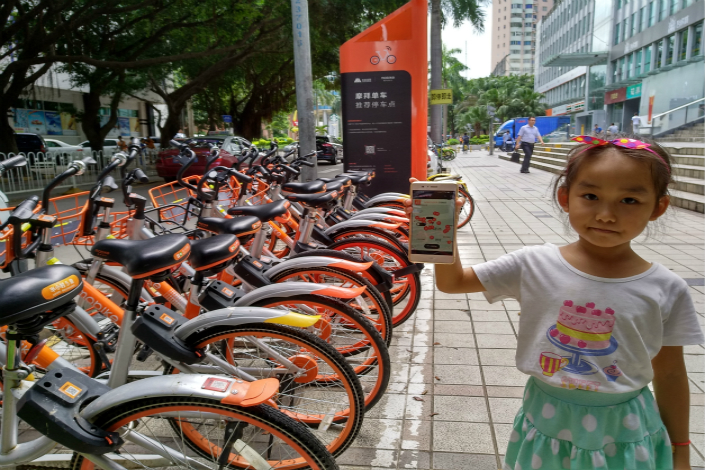Bike-Share Lovers Have to Hotfoot It When Locks Won’t Open

(Beijing) — A widespread snarl-up in the system of one of China’s leading bike-sharing services during rush hour stranded thousands who have rapidly come to depend on rented two-wheelers as part of their daily commute.
Users in major cities complained online of a system error on Mobike, saying they were unable to unlock the company’s trademark orange and silver two-wheelers at about 9 a.m. on Thursday. Users normally can unlock the bikes by using a special app on their smartphones to scan a unique QR code on the back of each bike.
Most unlockable bikes in Beijing, Guangzhou, Shanghai and Nanjing were back in service after about an hour, according to a Chinese media report. However, some users on Friday told Caixin that many bikes were apparently still affected by the glitch, generating a “service unavailable” message when QR codes were scanned.
Shanghai-based operator Beijing Mobike Technology Co. confirmed the problem, although it did not elaborate on its cause or magnitude.
The error was felt by legions of morning riders who have come to rely on the ubiquitous bikes to travel to work each day. Services like Mobike’s differ from traditional sharing services because they allow users to start riding wherever they can find a bike, and then park it wherever they want when they are finished.
“When I scanned the code, its progress bar stopped at zero and would not move,” fumed one user on Friday near Sanlitun, a major business and shopping area in Beijing. “The app showed gibberish and I wasted more than 10 minutes trying to unlock a bike.”
Another rider complained about the worthlessness of the virtual coupons that Mobike issued to apologize to users for the outage.
“Do you know what it feels like to see piles of bikes, but not be able to ride a single one?” the user wrote on Weibo, China’s equivalent of Twitter.
This is not the first time a technical hiccup has affected one China’s two leading bike-sharing firms — Mobike and Ofo Inc. — each of which now boasts tens of millions of users. Users of both services say that both systems have experienced short periods of downtime since September when they started growing in popularity.
Such short-term outages could become more common as the companies spend billions of yuan in investment cash to attract millions of new riders and expand into a growing number of global markets.
Contact reporter April Ma (fangjingma@caixin.com)

- 1Cover Story: China Carves Out a Narrow Path for Offshore Asset Tokenization
- 2Drownings Shake Chinese Enthusiasm for Travel to Russia
- 3Over Half of China’s Provinces Cut Revenue Targets
- 4Li Ka-Shing’s Port Empire Hit by Forced Takeover Amid Panama Legal Dispute
- 5In Depth: China’s Mutual Fund Industry Faces Overhaul After a Banner 2025
- 1Power To The People: Pintec Serves A Booming Consumer Class
- 2Largest hotel group in Europe accepts UnionPay
- 3UnionPay mobile QuickPass debuts in Hong Kong
- 4UnionPay International launches premium catering privilege U Dining Collection
- 5UnionPay International’s U Plan has covered over 1600 stores overseas






